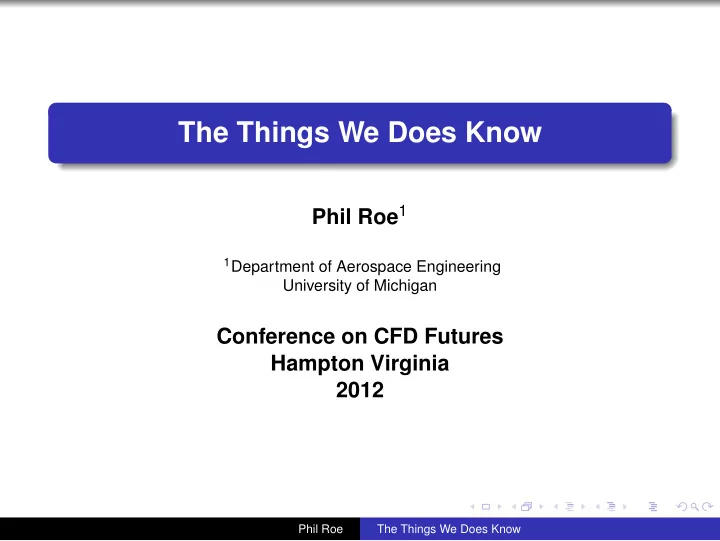

The Things We Does Know Phil Roe 1 1 Department of Aerospace Engineering University of Michigan Conference on CFD Futures Hampton Virginia 2012 Phil Roe The Things We Does Know
Artemus Ward (1834-1867) wrote that “It ain’t the things you dont know in life as gets you into trouble; it’s the things you does know as ain’t actually so.” Phil Roe The Things We Does Know
Evolution of CFD In 1974, when I first got involved in CFD, the most advanced method avaliable to industry was a second-order finite-volume method. In 2012, the most advanced method available to industry is .... A second-order finite volume method Of course, there have been many advances Unstructured and/or adaptive grids Physically-motivated flux functions (Fairly) fast implicit/multigrid solvers And along the way, there have been significant mutations, like the move to semi-discrete methods Phil Roe The Things We Does Know
Evolution of CFD In 1974, when I first got involved in CFD, the most advanced method avaliable to industry was a second-order finite-volume method. In 2012, the most advanced method available to industry is .... A second-order finite volume method Of course, there have been many advances Unstructured and/or adaptive grids Physically-motivated flux functions (Fairly) fast implicit/multigrid solvers And along the way, there have been significant mutations, like the move to semi-discrete methods Phil Roe The Things We Does Know
Evolution of CFD In 1974, when I first got involved in CFD, the most advanced method avaliable to industry was a second-order finite-volume method. In 2012, the most advanced method available to industry is .... A second-order finite volume method Of course, there have been many advances Unstructured and/or adaptive grids Physically-motivated flux functions (Fairly) fast implicit/multigrid solvers And along the way, there have been significant mutations, like the move to semi-discrete methods Phil Roe The Things We Does Know
Evolution of CFD In 1974, when I first got involved in CFD, the most advanced method avaliable to industry was a second-order finite-volume method. In 2012, the most advanced method available to industry is .... A second-order finite volume method Of course, there have been many advances Unstructured and/or adaptive grids Physically-motivated flux functions (Fairly) fast implicit/multigrid solvers And along the way, there have been significant mutations, like the move to semi-discrete methods Phil Roe The Things We Does Know
Evolution of CFD In 1974, when I first got involved in CFD, the most advanced method avaliable to industry was a second-order finite-volume method. In 2012, the most advanced method available to industry is .... A second-order finite volume method Of course, there have been many advances Unstructured and/or adaptive grids Physically-motivated flux functions (Fairly) fast implicit/multigrid solvers And along the way, there have been significant mutations, like the move to semi-discrete methods Phil Roe The Things We Does Know
Path-dependent evolution There is nothing unique about evolutionary design. At best it yields a local optimum. The local optimum that you end up in will depend on the path you took to get there; if you have fishlike ancestors you will have fishlike features. The skeletons of current CFD codes reveal their evolutionary trajectory. Phil Roe The Things We Does Know
Four things we does know The Euler equations can be closed by assuming an equilibrium equation of state (Zaide) The Navier Stokes equations are a parabolic system (Nishikawa) Residuals must be eliminated (Caraeni) A flux flows through a surface (Roe) The purpose of these talks is to to question some of our cherished assumptions, in preparation for the revolution. They are NOT intended to present a unified vision of CFD or anything else. That comes on Friday ;-) Phil Roe The Things We Does Know
Recommend
More recommend